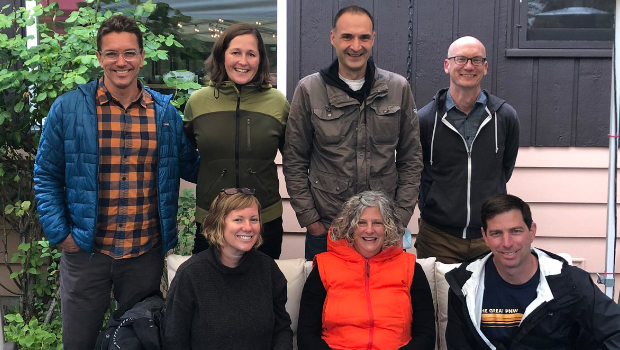Improving mental health care for youth

The IMPACT Center team at project launch. Back to front, left to right: Aaron Lyon, Cara Lewis, Pedja Klasnja, Michael Pullmann, Shannon Dorsey, Rene Hawkes, Bryan Weiner
Cara Lewis, PhD, co-leads a new center to accelerate use of evidence-based practices in under-resourced settings such as schools
Mental health care for most people under age 18 often takes place in community settings rather than large hospitals or specialty departments. Community clinics and schools often have limited funding and resources — yet treat serious conditions such as depression, anxiety, post-traumatic stress, and behavioral problems.
To improve mental health services for children, adolescents, and teens receiving care in the community, Kaiser Permanente Washington Health Research Institute (KPWHRI) and the University of Washington just launched a new center. The goal of the center is supporting community settings where diverse, low-income youth get care, to successfully deliver effective treatment for their mental health conditions.
KPWHRI Senior Investigator Cara Lewis, PhD, and University of Washington Department of Psychology Professor Shannon Dorsey, PhD, co-lead the Center to Optimize Evidence-Based Practice Implementation for Clinical Impact — known as the IMPACT Center. Lewis and Dorsey have expertise in practical implementation science, meaning they work with leaders and practitioners at clinical sites on ways to overcome challenges to delivering effective treatments and finding solutions that can be sustained, in a context with limited funding and resources.
Lewis and Dorsey answered questions about how the IMPACT Center will work with community sites, to optimize their use of evidence-based practices with the youth they serve.
Why did you decide to create an implementation research center focused on evidence-based mental health care for youth?
Lewis: Nearly 50% of youth have a mental health condition such as depression, anxiety, or post-traumatic stress. These conditions can have lifelong effects if untreated. A solid foundation of research suggests these conditions can be resolved with evidence-based practices.
An example is cognitive behavioral therapy (CBT) to train patients how to think about and change their moods and behavior. These types of therapy are shown to be effective for youth in multiple studies and randomized trials. However, often community settings find it difficult to implement CBT consistently in the face of challenges such as clients with multiple problems, high no-show rates, and limited time to prepare for sessions. This is where the IMPACT Center and our expertise in practical implementation science can help. We study how to effectively support community settings in integrating evidence-based practices into care, including measuring and evaluating if the practices help their clients in the long term. An important feature of the IMPACT Center is the Washington Evidence-Based Practice Initiative, which Dr. Dorsey co-leads.
Dorsey: The Washington Evidence-Based Practice Initiative CBT+ is a longstanding collaboration between Washington state, the University of Washington, and community mental health organizations statewide. We support community mental health clinics by providing multiple yearly trainings and expert consultation in CBT for the most common mental health conditions experienced by children and adolescents. We partner with experienced supervisors from these organizations to train about 250 clinicians each year. Nearly all community mental health organizations in Washington have been involved. We take a transdiagnostic and flexible approach, teaching CBT elements that cut across conditions.
What are the IMPACT Center goals over its 5 years of funding?
Lewis: All our work will involve clients and families who get care, both nationally and from the places participating in our projects. Their input guides our method development, refinement, and dissemination.
A requirement of our funding is providing rapid, practical ways to improve mental health care to have a measurable effect. Our plan is to overcome 3 implementation challenges with new methods that support our sites. Our methods will:
- Identify the greatest barriers to providing evidence-based practices at a location
- Find implementation strategies to overcome these barriers, and
- Test and optimize the strategies for measurable, sustainable effect.
Dorsey: Three IMPACT Center projects are launching soon.
Project 1 assists clinics in consistently measuring the impact of care on their clients’ symptoms by collaborating with youth and providers to unearth and target barriers.
Project 2 involves developing a supervisor-led implementation coaching program to be delivered to new community mental health clinics participating in CBT+ training.
Project 3 tests how we can more efficiently deliver a promising clinician-engagement strategy designed to improve school mental health providers’ ability to provide high-quality trauma-focused CBT.
What else should we know about the IMPACT center?
Lewis: We collaborate with diverse researchers and key stakeholders. Our team has experience in public health, and clinical, organizational, and community psychology, as well as anthropology, sociology, user-centered design, and information and computer sciences.
Researchers interested in this area should email us at michelle.x5.chan@kp.org about our training programs. They should also ask about our call for proposals for pilot programs, which we just released. We accept applications on a rolling basis.
Dorsey: Community practices interested in getting involved should contact us at that email address. Anyone interested in our results should watch for a CBT+ Initiative website that we'll build, with practical tools and evidence for others to use.
We invite you to join us if you're interested in advancing practical, collaborative, sustainable ways of rapidly improving the quality of youth community mental health care, in partnership with community care leaders and clinicians.
Other members of the IMPACT Center team from KPWHRI are Affiliate Investigators Bryan Weiner, PhD, and Pedja Klasnja, PhD; Senior Investigator Greg Simon, MD, MPH; and Assistant Investigators Marlaine Figueroa Gray, PhD, and Nora Henrikson, PhD, MPH. Funding for the IMPACT Center for 5 years is $6.1 million from the National Institute of Mental Health as an ALACRITY research center (for Advanced Laboratories for Accelerating the Reach and Impact of Treatments for Youth and Adults with Mental Illness).
profile

Why does Cara Lewis study implementation science?
We profile the KPWHRI associate investigator, a clinical psychologist who also studies social factors that affect health.
Research

Addressing the crisis of youth suicide in America
Rob Penfold, PhD, writes about suicide trends in children and adolescents and what researchers are doing about them.


